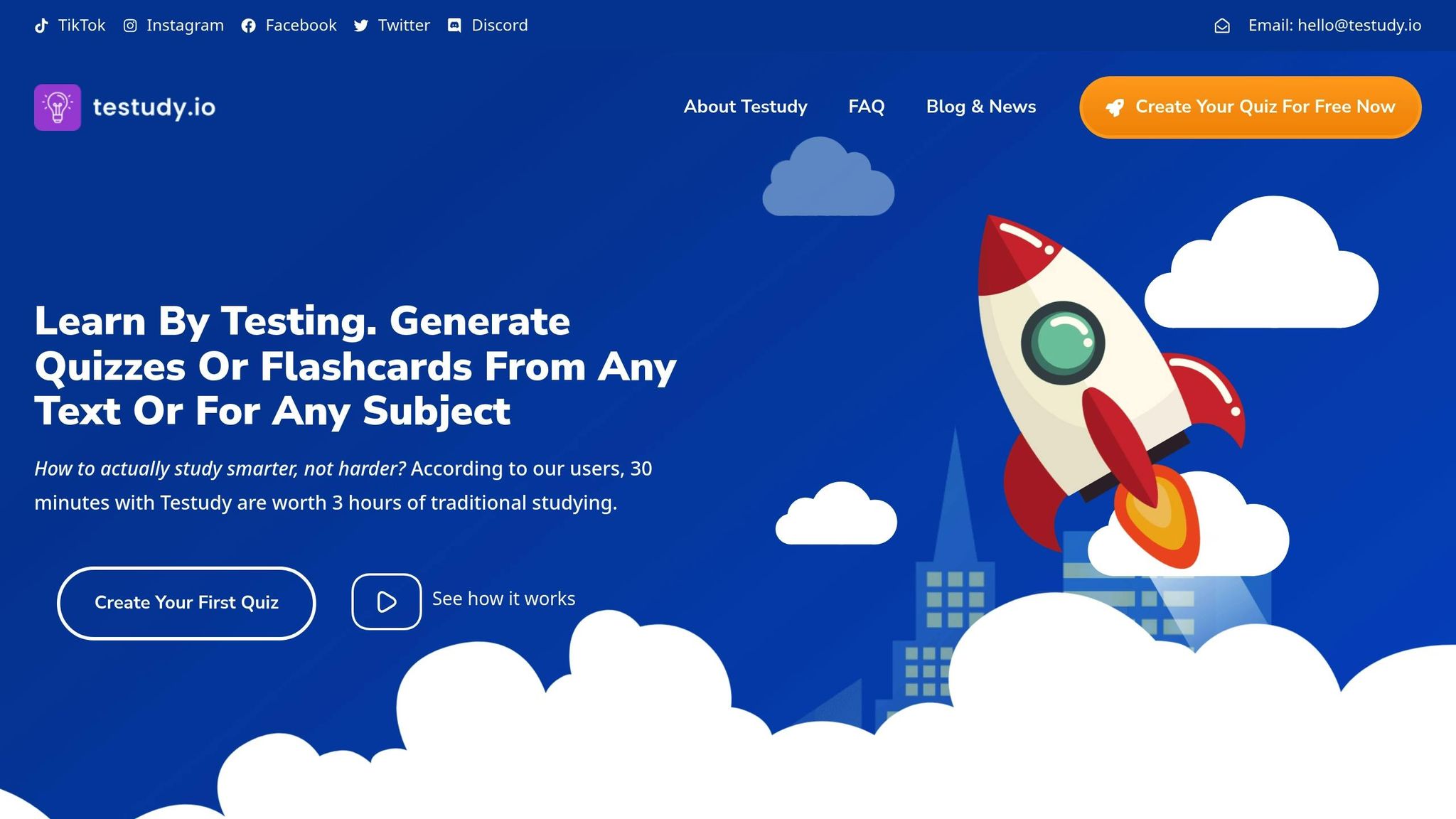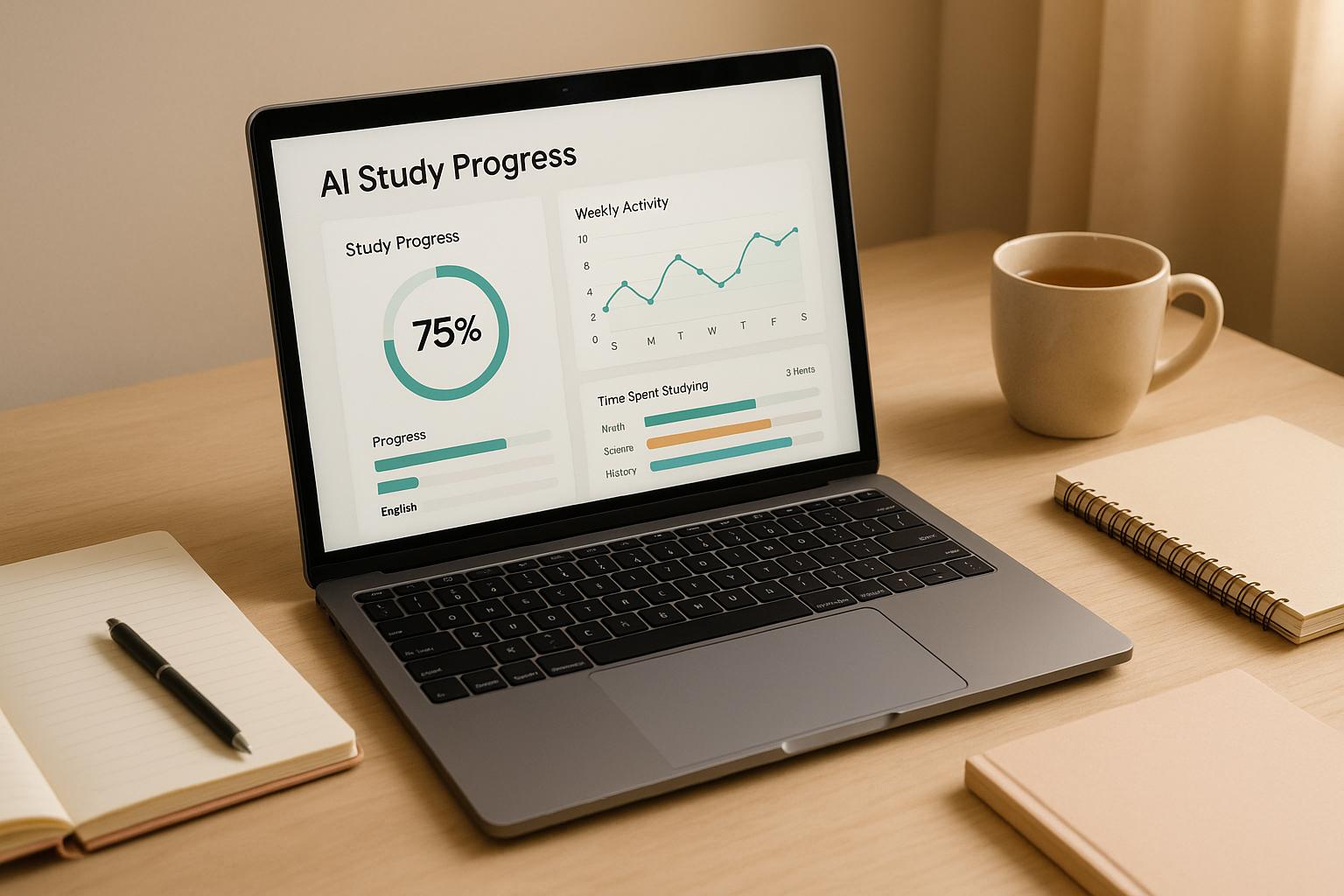AI study progress tools are transforming how students in the UK prepare for exams like GCSEs and A-levels. These tools use artificial intelligence to track learning habits, identify weak areas, and provide tailored recommendations for improvement. They help students optimise their study time, build confidence, and achieve better results.
Key Takeaways:
- What They Do: AI tools analyse study patterns, such as accuracy, retention, and response times, to create personalised study plans.
- Why They Matter: They provide clear insights into your progress, helping you focus on areas needing improvement while boosting your overall performance.
- How They Help: Features like adaptive scheduling, instant feedback, and customised quizzes make studying more efficient and effective.
- Example Tool: Testudy.io generates quizzes and flashcards from your study materials, tracks progress, and supports over 20 languages.
These tools are ideal for students juggling multiple subjects, offering a smarter way to prepare for exams and track academic growth.
The 8 Best AI-Powered Studying Apps (2024)
Main Features of AI Study Progress Tools
AI study progress tools are reshaping how students in the UK approach revision. These platforms use advanced technology to provide insights that were once difficult to access, making studying smarter and more efficient. Here’s a closer look at the standout features that make these tools so effective, starting with their automatic tracking and analytics.
Automatic Tracking and Analytics
One of the most powerful aspects of AI study tools is their ability to track your learning habits automatically without disrupting your workflow. These tools quietly monitor metrics like reading speed, response times, and even how often you pause, uncovering patterns that might otherwise go unnoticed.
The data collected is then turned into useful insights via analytics dashboards. For instance, you might discover that your focus drops during longer study sessions or that you consistently struggle with certain topics. This information can help you tweak your study routine and focus on where you need the most improvement.
What’s especially helpful for UK students is that these tools can adapt to various curriculum requirements. Whether you’re preparing for GCSEs or tackling university-level coursework, the AI adjusts to your specific educational needs, ensuring that the analytics are always relevant.
Personalised Feedback and Recommendations
AI study tools go beyond generic advice by offering feedback tailored to your progress. Unlike traditional study plans, these systems evolve with you, updating their guidance based on your performance and preferences.
As you work through practice questions, the tools provide instant feedback – not just telling you if you’re right or wrong, but explaining why a particular answer is correct. This helps you avoid repeating mistakes and deepens your understanding.
They also identify areas where you might need extra practice and suggest targeted exercises. At the same time, they schedule reviews of topics you’ve already mastered to ensure long-term retention. These tools even adapt the format of study materials to suit your learning style, whether you prefer visual aids or text-based explanations.
When it comes to exam preparation, these personalised recommendations help you create a balanced revision plan. Instead of focusing solely on your weaker areas, the tools ensure you’re improving across the board.
Integration and Accessibility
Modern AI study tools are built to fit seamlessly into the digital lives of UK students. They integrate with learning management systems, sync with calendar apps, and even work offline, so you can study wherever and whenever it suits you.
These tools are also versatile in handling different types of content. Whether you’re using PDF textbooks, online course materials, or photos of handwritten notes, the AI can process and include this information in your study tracking. This ensures that your progress insights remain comprehensive, no matter how varied your study resources are.
Data security is a priority too. Many platforms are designed to comply with GDPR regulations, giving you control over your personal information. Accessibility features are another key strength, with support for screen readers, adjustable text sizes, and keyboard navigation, making these tools suitable for students with diverse needs.
Whether you’re revising on a laptop at home, using a tablet on the go, or squeezing in study time on your phone, these tools ensure a consistent and connected experience across all your devices. This flexibility makes them a practical choice for today’s busy students.
Testudy.io: AI-Powered Study Progress Tracking

Testudy.io takes revision to the next level by combining detailed progress analytics with personalised feedback, all powered by AI. This platform creates custom quizzes and flashcards from any text, document, or subject, helping you streamline your study sessions. With support for over 20 languages, it’s a versatile tool for students in the UK, whether you’re tackling GCSE science or diving into A‑level literature.
Here’s a closer look at the standout features that make Testudy.io a game-changer.
Key Features of Testudy.io
The heart of Testudy.io lies in its AI-powered quiz and flashcard generation. Simply upload your study materials – be it PDF textbooks, lecture notes, or even handwritten documents – and the platform’s AI engine will generate questions that pinpoint key concepts. With its ability to support over 20 languages, Testudy.io ensures that language barriers won’t hold you back.
Its personalised study tracking is another highlight. The platform tailors quizzes specifically to your uploaded materials, offering targeted questions and preview queries to help you zero in on the most crucial areas. Plus, it’s equipped with collaborative features, allowing you to share your quizzes with classmates, making group study sessions more interactive and productive.
Testudy.io also gives you a head start by creating preview questions before you even begin studying. This early insight helps you identify the most important topics, ensuring your study time is focused and efficient.
These features are particularly well-suited to the needs of UK students.
Benefits for UK Students
Testudy.io’s personalised analytics cater to the diverse needs of students across the UK education system. It’s perfect for GCSE revision, where covering a broad range of foundational topics is key, as well as for A‑level studies, which require a more analytical approach. The platform’s question formats align with UK exam styles, helping you build both foundational knowledge and critical thinking skills.
Another major advantage is its flexibility across subjects. Whether you’re studying maths, history, or any other discipline, Testudy.io allows you to consolidate all your materials in one place, eliminating the hassle of juggling multiple platforms.
Plans and Pricing
Testudy.io offers a simple, tiered pricing structure to accommodate different study needs. The free plan provides basic access with a limited number of quizzes, making it a great way to try out the platform. For those needing more extensive revision tools, premium plans are available as semester-long or term-based subscriptions. These premium options grant unlimited access to AI-generated quizzes and flashcards, ensuring you have all the resources you need for in-depth study sessions. Whether you stick with the free plan or upgrade, Testudy.io has a solution to fit your schedule and budget.
sbb-itb-3165b23
How to Boost Productivity with AI Study Tools
Improving your study habits with AI tools isn’t just about using the latest technology – it’s about using it smartly. By tapping into AI’s ability to analyse data and personalise learning, you can create study sessions tailored to your academic goals.
Setting and Monitoring Study Goals
The first step to effective studying with AI tools is setting clear, measurable goals. Forget vague ambitions like “get better at maths” and aim for something specific, like “achieve 85% accuracy on algebra questions within three weeks.” Concrete targets give you direction and make it easier to track progress.
AI tools can break these broader objectives into smaller, daily tasks. For example, if your goal is to master organic chemistry reactions, the tool might generate a personalised timeline with daily study tasks and weekly progress checks. This way, you’re not just studying – you’re studying with purpose.
Time-based goals also become more meaningful when paired with AI analytics. Instead of studying for a set number of hours, you can focus on hitting milestones, like consistently scoring 80% on GCSE physics practice questions before moving on to harder topics. AI tools track your progress automatically, giving you real-time updates on whether you’re on track.
Regularly reviewing your performance data is just as important. Weekly check-ins can reveal patterns in your study habits – like struggling with certain question types on specific days or noticing that shorter, 25-minute sessions yield better retention than hour-long marathons. This ongoing feedback ensures your goals stay realistic and keeps you moving forward.
Once you’ve set your goals and started tracking progress, you can use the insights to zero in on your weak spots.
Using Data to Fix Weak Areas
AI tools shine when it comes to identifying and addressing knowledge gaps. Instead of revisiting material you already know, these tools highlight exactly where you’re struggling. For instance, platforms like Testudy.io can track repeated errors in quizzes, giving you a clear map of your strengths and weaknesses.
Say you’re scoring 60% on quadratic equations but 90% on linear functions. Rather than dividing your study time equally, you could dedicate 70% of your maths revision to quadratic equations until your scores improve. This targeted approach makes your study sessions far more effective.
AI tools also help uncover why you’re struggling. For example, if you’re having trouble with quadratic equations, the issue might not be the quadratic formula itself but a shaky grasp of algebraic manipulation. By addressing the root problem, you can make more lasting improvements.
Regularly reviewing your study data can also help you refine your overall strategy. You might notice that challenging topics are easier to tackle in the morning or that spacing out your practice sessions leads to better retention compared to last-minute cramming. These insights don’t just boost your understanding – they feed directly into your progress tracking, creating a cycle of continuous improvement.
Privacy and Accessibility Requirements
With all this data-driven learning, protecting your privacy and ensuring accessibility is crucial. In the UK, educational platforms must comply with GDPR, which means your personal data – like study materials and performance metrics – must be securely stored and handled.
When choosing an AI study tool, take a close look at its data retention policies. How long will your data be stored? Who can access it? Is it used to improve the platform? Understanding these details helps you pick a tool that aligns with your privacy preferences.
Privacy is especially important when sharing study materials with peers. The best platforms offer detailed controls over what information you share, so you can collaborate without compromising your personal data. At the same time, these tools should be accessible across all your devices, ensuring you can study securely and efficiently, no matter where you are.
Measuring Progress and Results
AI study tools shine when it comes to tracking your progress. Instead of relying on guesswork, these platforms provide hard data that shows how you’re really performing.
Tracking Improvement Over Time
One of the best ways to measure progress is by comparing your performance across multiple study sessions over time. AI tools automatically save your session data, making it easy to spot trends over weeks rather than focusing on day-to-day fluctuations.
For example, platforms like Testudy.io allow you to see how your baseline scores improve as you engage in targeted practice. With consistent effort, you’ll likely notice a steady upward trend, which can boost your confidence in your study techniques.
These tools also include topic mastery indicators, which highlight areas where you’re consistently scoring well. This helps you know when it’s time to move on to more advanced material rather than getting stuck on topics you’ve already mastered.
What’s important is the overall trend. A single off day won’t define your progress, but a series of declining scores might indicate you need to tweak your approach or seek extra help.
This numerical data sets the stage for visual tools that make your progress even clearer.
Charts and Progress Trends
Visual charts take raw data and turn it into an easy-to-read snapshot of your progress. Many AI study platforms generate graphs that map your performance over days, weeks, or even months, giving you a clear picture of how you’re doing.
Line graphs, for instance, can show whether you’re improving, plateauing, or slipping in your performance. A steady upward trend is a good sign your study methods are working, while a plateau might suggest it’s time to switch things up.
Subject-specific charts are also incredibly helpful. If you’re excelling in one subject but struggling in another, these visuals can help you decide where to focus your energy.
When preparing for exams, these trends become even more valuable. By tracking your progress over time, you can see whether your revision efforts are moving you closer to your target grades and adjust your strategy accordingly.
Using AI for Exam Preparation
AI tools turn exam prep into a strategic, data-driven process. For students in the UK preparing for GCSEs, A-levels, or university exams, these platforms can simulate real exam environments and provide targeted practice where it’s needed most.
Features like adaptive question selection focus on your weaker areas, while mock exam simulations help you get comfortable with the format and timing of actual exams. This approach not only strengthens your knowledge but also builds your confidence.
Spaced repetition algorithms are another game-changer. By revisiting older material at carefully timed intervals, these tools help you retain information long-term, even as you move on to new topics.
With these tools, abstract improvements become visible. Regular performance analytics during exam prep give you a clear view of how ready you are, making it easier to fine-tune your revision strategy as the big day approaches.
Conclusion
AI-powered study tools are reshaping how students in the UK approach their learning by making it more engaging and measurable. With features like automatically generated quizzes and flashcards, these tools allow you to test your knowledge and pinpoint areas that might need extra attention.
One major advantage is the tailored approach to revision they offer, helping students focus their efforts where it counts the most. This personalised method of studying ensures that time spent revising is both efficient and effective.
Platforms like Testudy.io highlight the potential of AI in revolutionising study routines. This online tool generates quizzes and flashcards from any text or subject, supporting over 20 languages to cater to the diverse needs of students. At just £10 per month for its Pro plan, which includes unlimited quiz and flashcard creation, Testudy.io makes structured and interactive revision accessible to everyone.
Whether you’re grappling with tough subjects or striving for higher qualifications, incorporating AI-driven tools into your study habits can bring the organisation and customisation needed to hit your academic targets. By embracing these technologies, you can move away from trial-and-error methods and adopt a more focused, results-oriented approach to learning.
FAQs
How do AI tools support different learning styles and educational needs?
AI tools are crafted to cater to different learning styles, whether someone learns best through visuals, listening, or hands-on activities. By leveraging smart algorithms, these tools adjust study materials, tweak difficulty levels, and deliver feedback tailored to each student’s unique preferences and progress.
They also track performance data, giving educators valuable insights into areas where students might need extra help. This allows teachers to provide focused support, ensuring that every learner gets a personalised experience that makes studying both productive and engaging.
How does Testudy ensure the privacy and security of personal data?
Testudy places a strong emphasis on privacy and data security, ensuring that your personal details and study materials are well-protected. The platform adheres to strict privacy regulations, guaranteeing that your information remains secure and confidential at all times.
To provide an extra layer of protection, Testudy employs advanced encryption technology for both data storage and transmission. This means you can concentrate on your studies without worrying about the safety of your information – it’s safeguarded every step of the way.
How can AI tools help students prepare more effectively for GCSEs and A-levels?
AI tools are reshaping how students prepare for GCSEs and A-levels by creating tailored learning experiences. These tools adapt to each student’s strengths and weaknesses, generating customised quizzes, flashcards, and practice questions that target the areas where they need the most support.
What’s more, they offer instant feedback and handle tasks like marking automatically, freeing up time and simplifying the revision process. By making studying more interactive and focused, these tools help students prepare more effectively and boost their confidence as exams approach.




